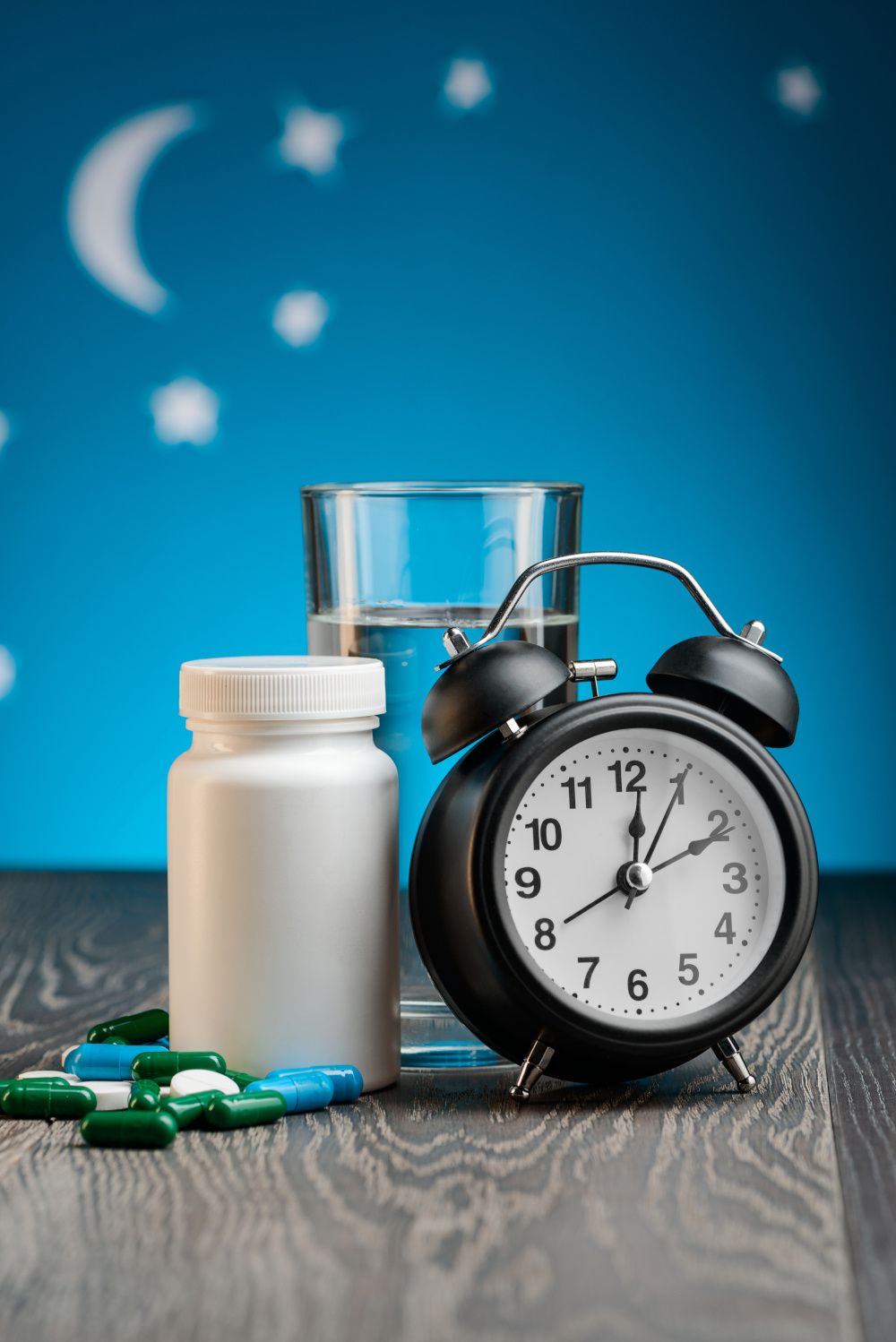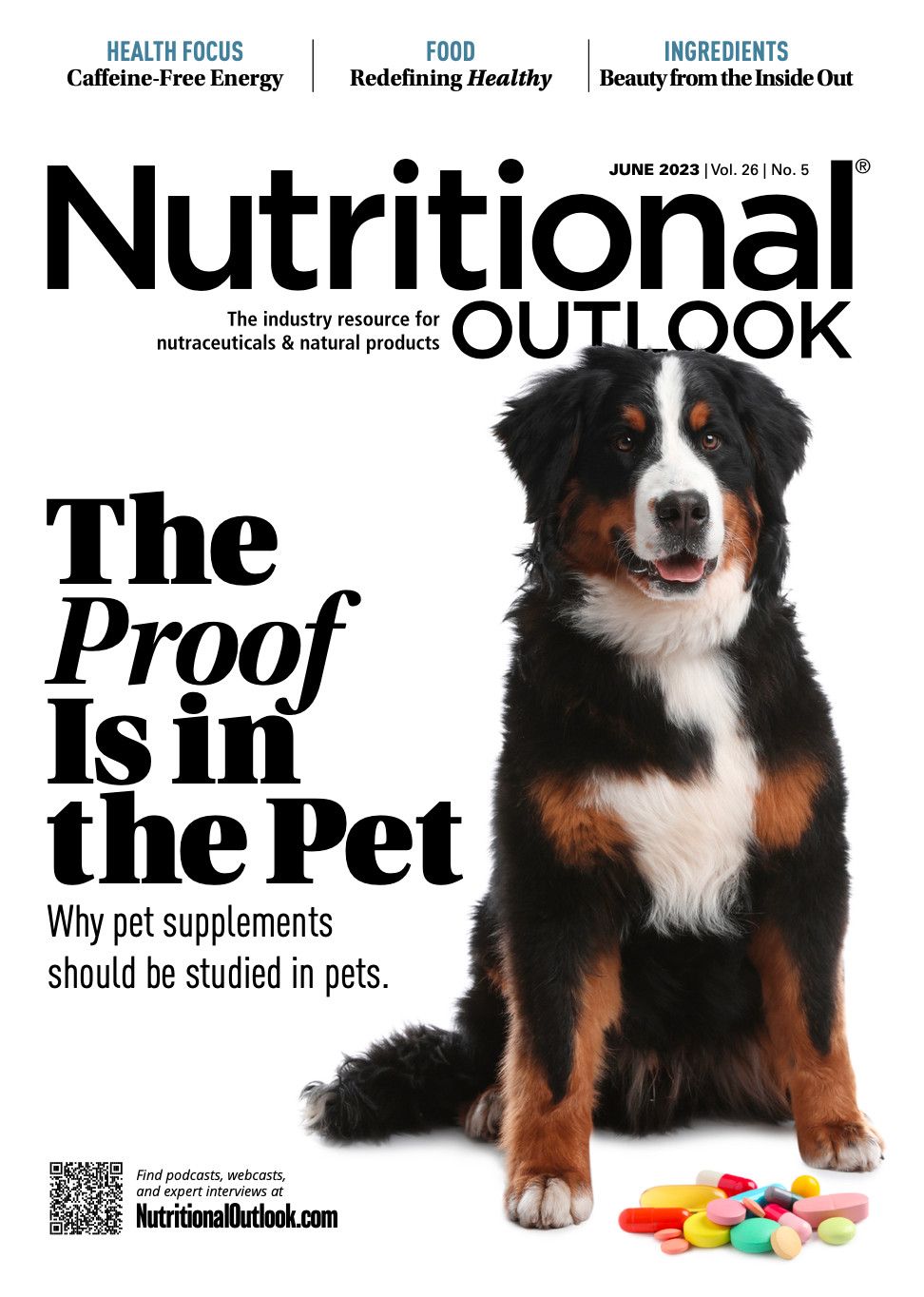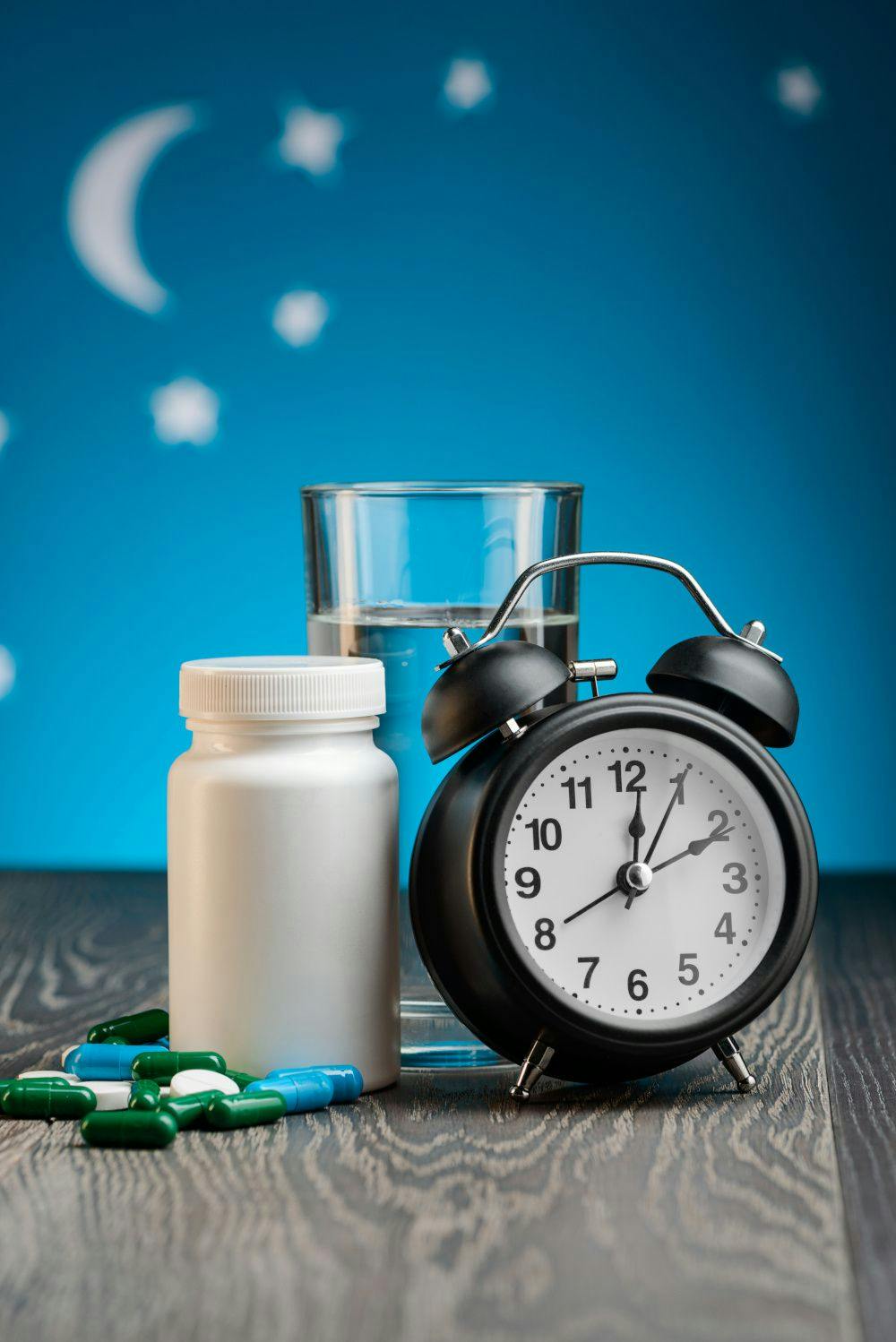Can supplements make consumers literally feel better about sleep?
And which emerging ingredients are coming down the pipeline for sleep supplements?
© Yuriygolub / Stock.adobe.com

Seems you can’t heave a bottle of melatonin gummies out the bedroom window these days without whacking a self-certified sleep guru on the head. But no sleep-science credentials are needed to grasp this fundamental fact: Mess with your proverbial forty winks and you won’t feel too happy about it in the morning.
After all, even a newborn knows that sleep and mood “are rather intimately intertwined,” as Rajat Shah, director, Nutriventia Ltd. (Mumbai, India), puts it. “And if ever there were a perfect example of a vicious cycle, the relationship between sleep and mood is it: When sleep is poor, mood is affected, and when mood is poor, sleep is affected.”
Unfortunately, modern times can do a number on both. As a result, modern humans suffer from disordered sleep and mood—if not outright mood and sleep disorders—more than they’d like.
The good news is that supplement brands are wise to this relationship, and they’ve put their scientists to work both teasing out sleep and mood’s intricacies and building formulations that improve the prospects for both.
Losing Sleep
If contemporary consumers seem obsessed with sleep, they can be forgiven: We tend to obsess about what we lack. And as Shah points out, “Over the past several years, worry has descended on the population, causing many a sleepless night.”
Given that we spend roughly one third of our lives either in sleep or pursuing it1, that’s nothing to...snooze at? Yet only 32% of respondents to a 2022 Gallup survey2 claimed to get “excellent” or “very good” sleep, with almost as many, 33%, describing their sleep as “fair” or “poor.”
And as for what’s sullying our sleep hygiene, Josh Beaty, marketing director, NuLiv Science (Brea, CA), lays the blame on “modern lifestyles, 24/7 culture, constant connectivity, and increased stress—especially within the past few years.” His conclusion? “With more consumers realizing how sleep affects health, cognitive function, and emotional well-being, it’s no wonder it’s become such a hot topic.”
Sleep Matters
Indeed, Beaty says, “Research dating back to 20103 shows that inadequate sleep can lead to chronic health issues like obesity, diabetes, and cardiovascular disease.”
Michael Breus, PhD, founder of TheSleepDoctor.com, even goes so far as to call sleep “a necessary component of good health”—which, when you explore the evidence, isn’t that far off a call at all.
For example, he explains, “Research reveals that shift workers whose circadian rhythms become disturbed by working at night and sleeping during the day may be more likely to develop conditions such as diabetes and breast cancer.”
Even short of that, poor sleep puts a damper on everyday life. “The increased daytime sleepiness that sleep deprivation causes may make it difficult to socialize and focus on tasks,” Breus points out, “and drowsiness may put a drowsy driver and anyone on the road with them at higher risk.”
While You Were Sleeping
So what is it about sleep that makes shortchanging it so inadvisable?
“There’s no single explanation clarifying why sleep impacts us so immensely,” Breus concedes, “but sleep researchers have developed multiple theories explaining its importance, which I write about extensively on my website.”
For example, while human metabolism slows significantly during sleep, sleep is also “connected to the metabolic processes that let the body transform food into energy,” Breus notes. Thus, the energy-conservation theory suggests that we use time asleep “to save energy for more active periods,” he says.
According to the synaptic homeostasis hypothesis, adds Qi Jia, PhD, president and CEO, Unigen Inc. (Tacoma, WA), “Sleep is the price the brain pays for plasticity4.” In other words, while we’re awake and learning, our brains forge and strengthen neuronal connections—an energetically taxing process. “When we sleep,” he explains, “that neuronal activity normalizes strength and restores cellular homeostasis. Thus these phenomena help the brain acquire, consolidate, and integrate memory.”
Meanwhile, the restorative theory holds that sleep gives the body time to repair. “Studies indicate that sleep is linked to cells and hormones involved in growth, cell repair, and tissue regeneration,” Breus says, including growth hormone, for example, much of which we release during sleep.
The glymphatic system is also more active during sleep, Beaty adds, shuttling metabolic waste out of the brain to maintain cognitive function and protect against neurodegeneration. Breus notes a study that found sleep quality crucial to healing in subjects who had undergone rotator-cuff surgery, “and we know that healthy sleep is also associated with better immune health,” he says.
Quality Time
But “healthy” vis-a-vis sleep doesn’t just mean “more.” As Denis Alimonti, director of U.S. nutrition, Maypro Group (Purchase, NY), says, “It’s not only about the hours logged; it’s about the quality of those hours—and studies suggest that people today aren’t getting enough sleep, and the quality of sleep they get may not be optimal.”
That suboptimal quality emerges from a compromise in what experts call “sleep architecture,” or the structural organization of normal sleep5. And that structural organization rests on two main stages: non-rapid eye movement sleep, or NREM, and rapid eye movement, or REM, sleep.
NREM sleep comprises three further stages that go from light to deep, Beaty explains, “and it’s during the deeper stages—particularly slow-wave sleep—that our brains consolidate memories and engage in synaptic pruning: refining neural connections and making our brains more efficient.”
REM sleep, for its part, constitutes dreamtime, when the brain processes and integrates emotional experiences to “help us better handle stress and emotional challenges,” Beaty says. The unique neural activation patterns that characterize this sleep stage also seem linked to creativity and problem solving—“abilities we all need to thrive,” he says.
It’s only when we cycle through all these stages for sufficient time and with minimal interruptions that we truly press the “sleep reset button,” as Beaty calls it, that lets us “recover physically, consolidate memories, regulate emotions, and solve problems more effectively.” And we know we’ve pulled that off when we awaken feeling refreshed and ready to wrap our brains around the day.
Sleep-Mood Axis
“On the other hand,” Beaty continues, “a bad night’s sleep might result in fatigue, irritability, and diminished cognitive performance.”
You don’t say. Yet while this phenomenon is self-evident to all, scientists are knee-deep in the details of how and why it happens, and as Shah says, “Just as there’s much talk about the gut-brain axis, we believe there’s also a sleep-stress-mood axis.”
That makes sense to Beaty. As he reminds us, “When we’re in that REM stage of sleep, our brains are hard at work processing emotional experiences, and this helps us deal with negative emotions more effectively.” In fact, a 2001 study6 found that REM sleep can alter the emotional intensity of memories, “which, in turn, helps us maintain emotional resilience,” he notes.
By contrast, sleep deprivation “can make us more emotionally reactive and impair our ability to regulate emotions,” he goes on. “One 20117 study showed how sleep-deprived individuals had increased amygdala activity when they encountered negative stimuli. This basically means they had a heightened emotional response, so getting enough sleep is crucial if we want to keep our emotional balance.”
Beyond its effects on emotional regulation, poor sleep quality and quantity are “big risk factors” for developing mental-health problems, Breus adds. Because of the close relationship between sleep and the neurotransmitters serotonin and dopamine, changes in sleep patterns can trigger symptoms of conditions like depression, anxiety, bipolar disorder, and schizophrenia, he notes.
Moreover, anxiety and sleep interact in what Breus describes as a “negative-feedback loop—so sleep issues lead to increased anxiety, and anxiety makes sleeping worse.” Troubled sleep also often accompanies—and can cause—depressive episodes; as Breus explains, “Similar to anxiety, most people with depression have trouble falling asleep and wake up often during the night.” Yet he also notices that many such patients sleep longer than usual.
Two in One
“Interestingly” Beaty notes, “sleep can even affect positive emotions: Sleep deprivation can actually reduce our ability to experience pleasure or positive feelings.” And for that reason and more, he continues, “We’re seeing a steady increase in demand for supplements that address sleep and mood.”
While he lauds melatonin, magnesium, and L-theanine as “solid choices” for tackling both, he lauds the supplement industry’s efforts to develop even better alternatives.
For example, NuLiv Science developed Zylaria—“a unique composition of highly purified fractions extracted from Xylaria nigripes extract (mycelium), Cuscuta chinensis (seed) extract, and Panax notoginseng (root) extract,” Beaty explains—to support both sleep and mood via action on GABA, or gamma-aminobutyric acid.
A major sleep regulator, GABA “puts the brakes on nerve activity, helping us feel more relaxed,” Beaty says. “It’s kind of like our brain’s built-in tranquilizer.” Zylaria appears to elevate GABA content in PC-12 neurons, which Beaty says “show neuronal function and differentiation in the context of various neurological processes, including sleep.” They do this by increasing GABA content itself, as well as by upregulating the activity of GAD, which controls GABA synthesis, and decreasing the activity of GABA transaminase, which degrades GABA.
Jia submits Unigen’s Maizinol as another example of a supplement that improves both sleep and mood. Extracted from immature corn (Zea mays) leaves, the ingredient’s active, 6-MBOA, shares structural similarity with melatonin, allowing it to bind the same MT1 and MT2 receptors that trigger the latter’s physiological effects.
The compound appears to have a particular affinity for the MT2 receptor, Jia notes, which “is known to promote non-REM sleep when activated.” And, in fact, a randomized, double-blind, placebo-controlled clinical study8 found that the supplement produced a statistically significant, roughly 30-minute increase in restorative sleep relative to the placebo, with subjects in the supplement group experiencing a 36% reduction in levels of salivary cortisol—the “stress hormone”—and a 49% improvement in sleep quality as measured by the Pittsburgh Sleep Quality Index (PSQI).
An earlier clinical study9 in subjects with mild depression and anxiety found that supplementation with the extract produced statistically significant improvements in both as soon as four weeks into the eight-week protocol, with the supplement performing comparably to S-adenosyl-L-methionine, or SAMe, a supplement popularly marketed to address low mood.
Maypro markets its proprietary asparagus extract, ETAS, to support sleep and stress, as well. The extract works, Alimonti explains, by increasing production of the heat-shock protein 70 (HSP70), an endogenous protein produced in response to stress. “HSP helps ensure correct protein folding and repairs damaged cells,” he says, “tipping the balance from excitatory cytokines to inhibitory ones. It also serves as an antioxidant.”
One study10 involving healthy male subjects found that those in the supplementation group exhibited suppression of cortisol level increase and decreased expression of chromogranin A, a marker of psychological stress—both of which Alimonti says “led to better sleep.”
And to answer demand for a more effective class of melatonin supplements, the company offers MicroActive melatonin. “Lifestyle factors” like excessive light and shift work can impair most melatonin supplements’ absorption, Alimonti says; what’s more, what melatonin the body does absorb can release slowly and unpredictably, leaving users feeling groggy in the morning.
“MicroActive melatonin was designed to improve melatonin absorption and provide prolonged release throughout the night,” he claims. “Using a micronized, sustained-release technology that ensures gradual release over seven hours, it supports better sleep throughout the night and is suitable for gummies.”
Also offering sustained release is Nutriventia’s Prolanza, an ashwagandha (Withania somnifera) supplement extracted to a high concentration of 10 USP withanolides (4% to 5%) and 10 other active withanolides using proprietary technology. The company then encapsulates those actives in a matrix that prolongs release more than eight hours, leading to what Shah says is a “clinically substantiated presence in plasma after 24 hours.”
Results of a randomized, double-blind, placebo-controlled trial11 on 100 healthy adults showed that those supplementing with 300 mg of the supplement for 90 days exhibited statistically significant and clinically relevant reductions in perceived stress and serum cortisol levels compared to placebo. “Scores on the PSQI also indicate that the ingredient significantly improved sleep quality by 3.5 times, while responses to the Oxford Happiness Questionnaire pointed to a nearly twofold improvement in mental well-being,” Shah adds. “Subjects also experienced 3.6-fold better memory recall using CANTAB”—the Cambridge Neuropsychological Test Automated Battery—“and 1.5-fold better visual accuracy also using CANTAB compared to the placebo group.”
Finally, notes Chris Sadewasser, global product manager, Kemin Human Nutrition and Health (Des Moines, IA), “One great option to support sleep health is DailyZz,” a proprietary blend of spearmint and green tea extracts with clinical evidence for its support of sleep quality and next-day functioning.12 “DailyZz works by providing neuro-supportive polyphenols that can help protect neuronal cells, elevate neurotransmitter levels, and decrease oxidative stress to support healthy sleep and a healthy brain,” he says.
Bright Days Ahead
Sounds like a winning combination. After all, Beaty notes that Global Info Research valued the sleep-supplement market at $7.6 billion in 2022 and predicts a rise to $14.6 billion by 2029, representing compound annual growth of 9.8%.13 Meanwhile, mood-support supplements look set to compound their annual growth at a rate of 12.5% from 2023 to 2030.14
And though analysts often view the two markets separately, “their close relationship means that many consumers look for products that address both,” Beaty wagers. “So I think we’ll see more convergence between the two markets in the next few years as research demonstrates the correlations further.”
And that research is everything. “The sector will need to remain innovative and adaptable,” Beaty stresses. “This includes investing in research and development and exploring new product formats. If we do this, the market has the potential not only to continue its impressive growth but to truly revolutionize how we approach sleep and mood health for consumers.”
References
- Aminoff, M.J.; Bolsler, F.; Swaab, D.F. We Spend About One-Third of Our Life Either Sleeping or Attempting to Do So. Handb Clin Neurol. Published online May 9, 2012. DOI: 10.1016/B978-0-444-52006-7.00047-2
- Gallup. Casper-Gallup State of Sleep in America 2022 Report. https://www.gallup.com/analytics/390536/sleep-in-america-2022.aspx
- Cappuccio, F.P.; D’Elia, L.; Strazzullo, P.; Miller, M.A. Sleep Duration and All-Cause Mortality: A Systematic Review and Meta-Analysis of Prospective Studies. Sleep. 2010, 35 (5), 585-592. DOI: 10.1093/sleep/33.5.585
- Tononi, G.; Cirelli, C. Sleep and the Price of Plasticity: From Synaptic and Cellular Homeostasis to Memory Consolidation and Integration. Neuron. 2014, 81 (1), 12-34. DOI: 10.1016/j.neuron.2013.12.025
- National Library of Medicine, National Institutes of Health. Sleep Disorders and Sleep Deprivation: An Unmet Public Health Problem. https://www.ncbi.nlm.nih.gov/books/NBK19956/
- Wagner, Ul; Gais, S.; Born, J. Emotional Memory Formation Is Enhanced Across Sleep Intervals with High Amounts of Rapid Eye Movement Sleep. Learn Memory. 2001, 8 (2). DOI: 10.1101/lm.36801
- Gujar, N.; Yoo, S.S.; Hu, P.; Walker, M.P. Sleep Deprivation Amplifies Reactivity of Brain Reward Networks, Biasing the Appraisal of Positive Emotional Experiences. J Neurosci. 2011, 31 (12), 4466-4474. DOI: 10.1523/jneurosci.3220-10.2011
- Talbott, S.M.; Talbott, J.A.; Brownell, L.; Yimam, M. UP165, a Standardized Corn Leaf Extract for Improving Sleep Quality and Mood State. J Med Food. 2023, 26 (1), 59-67. DOI: 10.1089/jmf.2021.0197
- Kalman, D.S.; Feldman, S.; Vazquez, R.R.; Krieger, D.R. A Prospective Randomized Double-Blind Study Evaluating UP165 and S-Adenosyl-L-Methionine on Depression, Anxiety and Psychological Well-Being. Foods. 2015, 4 (2), 130-139. DOI: 10.3390/foods4020130
- Ito, T.; Goto, K.; Takanari, J.; et al. Effects of Enzyme-Treated Asparagus Extract on Heat Shock Protein 70, Stress Indices, and Sleep in Healthy Adult Men. J Nutr Sci Vitaminol (Tokyo). 2014, 60 (4), 283-290. DOI: 10.3177/jnsv.60.283
- Gopukumar, K.; Thanawala, S.; Somepalli, V.; Rao, T.S.S.; Thamatam, V.B.; Chauhan, S. Efficacy and Safety of Ashwagandha Root Extract on Cognitive Functions in Healthy, Stressed Adults: A Randomized, Double-Blind, Placebo-Controlled Study. Evid Based Complement and Alternat Med.Published online November 30, 2021. DOI: 10.1155/2021/8254344
- Tubbs, A.S.; Kennedy, K.E.R.; Alfonso-Miller, P.; Willis, C.C.A.; Grandner, M.A. A Randomized, Double-Blind, Placebo-Controlled Trial of a Polyphenol Botanical Blend on Sleep and Daytime Functioning. Int J Environ Res Public Health. 2021, 18 (6), 3044. DOI: 10.3390/ijerph18063044
- Global Info Research. Global Sleep Supplement Market 2023 by Manufacturers, Regions, Type and Application, Forecast to 2029. Published February 16, 2023. https://www.industryresearch.co/global-sleep-supplement-market-22581108
- Reliable Research Reports. Global Mood Support Supplements Market Growth 2023-2028. Published May 2023. https://www.reliableresearchreports.com/global-mood-support-supplements-market-r1517121


















